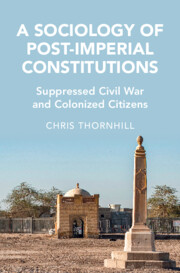Book contents
- A Sociology of Post-Imperial Constitutions
- Cambridge Studies in Law and Society
- A Sociology of Post-Imperial Constitutions
- Copyright page
- Dedication
- Contents
- Acknowledgements
- Introduction
- Chapter One Imperialism and the Origins of Constitutions
- Chapter Two Constitutions and the Persistence of Empires
- Chapter Three Imperialism and Global Civil War
- Chapter Four Imperial Nations in Latin America
- Chapter Five Military Constitutions in and after the Ottoman Empire
- Chapter Six World Law and Occupation Constitutions
- Chapter Seven The Occupation Constitution II
- Chapter Eight The Occupation Constitution III
- Chapter Nine Constitutions after War
- Chapter Ten New Security Constitutions
- Conclusion
- Bibliography
- Index
- Cambridge Studies in Law and Society
Chapter Three - Imperialism and Global Civil War
Published online by Cambridge University Press: 06 December 2024
- A Sociology of Post-Imperial Constitutions
- Cambridge Studies in Law and Society
- A Sociology of Post-Imperial Constitutions
- Copyright page
- Dedication
- Contents
- Acknowledgements
- Introduction
- Chapter One Imperialism and the Origins of Constitutions
- Chapter Two Constitutions and the Persistence of Empires
- Chapter Three Imperialism and Global Civil War
- Chapter Four Imperial Nations in Latin America
- Chapter Five Military Constitutions in and after the Ottoman Empire
- Chapter Six World Law and Occupation Constitutions
- Chapter Seven The Occupation Constitution II
- Chapter Eight The Occupation Constitution III
- Chapter Nine Constitutions after War
- Chapter Ten New Security Constitutions
- Conclusion
- Bibliography
- Index
- Cambridge Studies in Law and Society
Summary
This chapter assesses the rise of democratic constitutional rule after 1918. It covers a range of societies, but focuses on Germany, Poland and Spain. In different ways, it shows how constitutions created at this time were designed to move government away from imperialist models. However, constitutions remained enduringly attached to military organizations, and most were unsettled by military violence. Distinctively, constitutions of this period tended to weaken the partition between the sovereign nation state and the global military environment, and they resulted in governments that declared war on sections of their own populations. In such cases, governments patterned their own societies on colonial systems of organization.
- Type
- Chapter
- Information
- A Sociology of Post-Imperial ConstitutionsSuppressed Civil War and Colonized Citizens, pp. 167 - 219Publisher: Cambridge University PressPrint publication year: 2024

